复旦高级英语第一课课文翻译
高级英语第一,二课的课后翻译
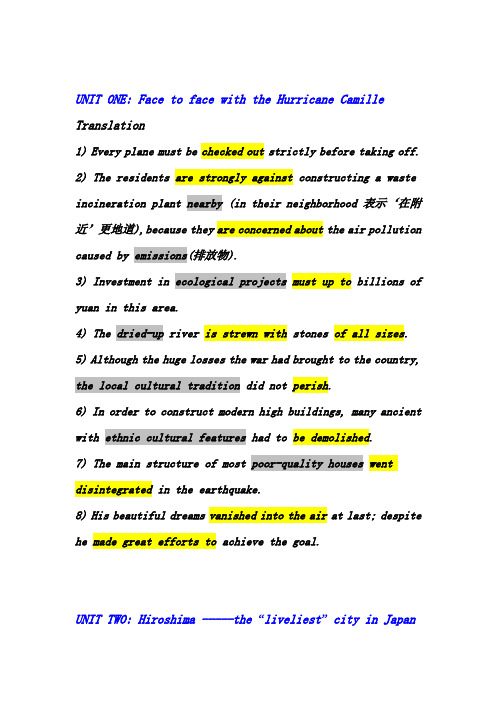
UNIT ONE: Face to face with the Hurricane Camille Translation1) Every plane must be checked out strictly before taking off.2) The residents are strongly against constructing a waste incineration plant nearby (in their neighborhood 表示‘在附近’更地道),because they are concerned about the air pollution caused by emissions(排放物).3) Investment in ecological projects must up to billions of yuan in this area.4) The dried-up river is strewn with stones of all sizes.5) Although the huge losses the war had brought to the country, the local cultural tradition did not perish.6) In order to construct modern high buildings, many ancient with ethnic cultural features had to be demolished.7) The main structure of most poor-quality houses went disintegrated in the earthquake.8) His beautiful dreams vanished into the air at last; despite he made great efforts to achieve the goal.UNIT TWO: Hiroshima -----the “liveliest” city in JapanTranslation1) There is no one in the hall.The meeting must have been put off.2) The modern construction looks very much like UFO.3) As for the northerners, Sichuan dialect sounds much the same as Hubei dialect. It is sometimes difficult to tell one from the other.4) The very sight of the monument reminds me of my good friend who was killed in the battle.5) He was so deep in thought that he was oblivious of what his friends were talking about.6) What he did had nothing to do with her.7) She couldn't fall asleep as her daughter's illness was very much on her mind.8) I have had the matter on my mind for a long time.9) He loves such gatherings at which he rubs shoulders with young people and exchange opinions with them on various subjects.10) It was only after a few minutes that his words sank in.11) The soil smells of fresh grass.12) Could you spare me a few minutes?13) Could you spare me a ticket?14) That elderly grey-haired man is a coppersmith by trade.。
高级英语lesson1课文翻译

Face To Face With Hurricane Camille迎战卡米尔号飓风约瑟夫.布兰克1 John Koshak,Jr.,knew Hurricane Camille would be bad.Radio and television warnings had sounded throughout that st August17,as Camille lashed northwestward across the Gulf of Mexico.It was certain to pummel Gulfport,Miss.,where the Koshaks lived.Along the coasts of Louisiana,Mississippi and Alabama,nearly150,000people fled inland to safer ground.But like thousands of others in the coastal communities,John was reluctant to abandon his home unless the family—his wife,Janis and their seven children,aged3to11—was clearly endangered.小约翰·柯夏克已料到,卡米尔号飓风来势定然凶猛。
就在去年8月17日那个星期天,当卡米尔号飓风越过墨西哥湾向西北进袭之时,收音机和电视里整天不断地播放着飓风警报。
柯夏克一家居住的地方——密西西比州的高尔夫港——肯定会遭到这场飓风的猛烈袭击。
路易斯安那、密西西比和亚拉巴马三州沿海一带的居民已有将近15万人逃往内陆安全地带。
但约翰就像沿海村落中其他成千上万的人一样,不愿舍弃家园,要他下决心弃家外逃,除非等到他的一家人——妻子詹妮丝以及他们那七个年龄从三岁到十一岁的孩子一一眼看着就要灾祸临头。
Hugh Garner 复旦高级英语第一册第一课

During the Depression he “rode the rails” across Canada and the United States, working at a number of different jobs. He also fought in the Spanish Civil War. When World War II broke out, he joined the Navy and served on Atlantic convoy duty until 1945. Garner’s most famous novel, Cabbagetown, published in abridged form in 1950, depicted life in the Toronto neighborhood of Cabbagetown, then Canada’s most famous slum, during the Depression.
Garner struggled much of his life with alcoholism, and died in 1979 of alcoholrelated il公寓在线隶属于同维思 创网络科技(北京)有限责任公司。公司 总部位于国家级大学科技园 --- 中国人民大 学文化科技园。 • 提供免费的海外学生公寓在 线预订服务,不收取任何手续费或中介费。 留学生直接向海外学生公寓支付费用, 无任 何中间环节。
Toronto, Ontario, Canada
Hugh Garner
Born in Yorkshire, England, Garner came to Canada in 1919 with his parents. He was raised in Toronto, Ontario.
高级英语第一课课文逐句翻译

Rock is the music of teenage rebellion.
--- John Rockwell, rock music critic
知其崇拜何人便可知其人。 来自 ——小说家罗伯特?佩恩?沃伦
By a man’s heroes ye shall know him.
你也和克利斯?辛格一样对鲍勃?狄伦怀有几乎是宗教般的崇敬吗?
Do you share Chris Singer’s almost religious reverence for Bob Dylan?
你认为他或狄伦是步入歧途吗?
Do you think he – or Dylan – is misguided?
这些并不是闲谈。
These aren’t idle questions.
有些社会学家认为对这些问题的回答可以充分说明你在想些什么以及社会在想些什么——也就是说,有关你和社会的态度。
Some sociologists say that your answers to them could explain a lot about what you are thinking and about what your society is thinking – in other words, about where you and your society are.
滚石摇滚乐队的迈克?贾格尔正在台上演唱“午夜漫步人”。
Mick Jagger of the Rolling Stones was singing “Midnight Rambler.”
演唱结束时评论家唐?赫克曼在现场。
Critic Don Heckman was there when the song ended.
高级英语第一册Unit 1 (文章结构+课文讲解+课文翻译+课后练习+答案)
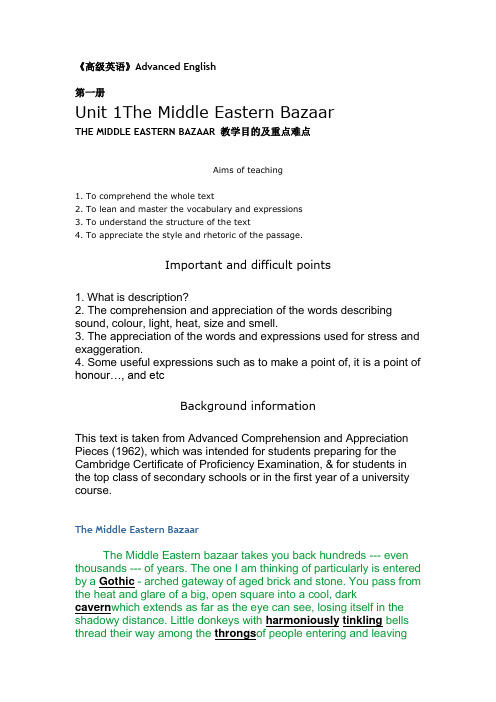
《高级英语》Advanced English第一册Unit 1The Middle Eastern BazaarTHE MIDDLE EASTERN BAZAAR 教学目的及重点难点Aims of teaching1. To comprehend the whole text2. To lean and master the vocabulary and expressions3. To understand the structure of the text4. To appreciate the style and rhetoric of the passage.Important and difficult points1. What is description?2. The comprehension and appreciation of the words describing sound, colour, light, heat, size and smell.3. The appreciation of the words and expressions used for stress and exaggeration.4. Some useful expressions such as to make a point of, it is a point of honour…, and etcBackground informationThis text is taken from Advanced Comprehension and Appreciation Pieces (1962), which was intended for students preparing for the Cambridge Certificate of Proficiency Examination, & for students in the top class of secondary schools or in the first year of a university course.The Middle Eastern BazaarThe Middle Eastern bazaar takes you back hundreds --- even thousands --- of years. The one I am thinking of particularly is entered by a Gothic - arched gateway of aged brick and stone. You pass from the heat and glare of a big, open square into a cool, darkcavern which extends as far as the eye can see, losing itself in the shadowy distance. Little donkeys with harmoniously tinkling bells thread their way among the throngs of people entering and leavingthe bazaar. The roadway is about twelve feet wide, but it is narrowed every few yards by little stalls where goods of every conceivable kind are sold. The din of the stall-holder; crying their wares, of donkey-boys and porters clearing a way for themselves by shouting vigorously, and of would-be purchasers arguing and bargaining is continuous and makes you dizzy.Then as you penetrate deeper into the bazaar, the noise of the entrance fades away, and you come to the muted cloth-market. The earthen floor, beaten hard by countless feet, deadens the sound of footsteps, and the vaulted mud-brick walls and roof have hardly any sounds to echo. The shop-keepers speak in slow, measured tones, and the buyers, overwhelmed by the sepulchral atmosphere, follow suit .One of the peculiarities of the Eastern bazaar is that shopkeepers dealing in the same kind of goods do not scatter themselves over the bazaar, in order to avoid competition, but collect in the same area, so that purchasers can know where to find them, and so that they can form a closely knit guild against injustice or persecution . In the cloth-market, for instance, all the sellers of material for clothes, curtains, chair covers and so on line the roadway on both sides, each open-fronted shop having a trestle trestle table for display and shelves for storage. Bargaining is the order of the cay, and veiled women move at a leisurely pace from shop to shop, selecting, pricing and doing a little preliminary bargaining before they narrow down their choice and begin the really serious business of beating the price down.It is a point of honour with the customer not to let the shopkeeper guess what it is she really likes and wants until the last moment. If he does guess correctly, he will price the item high, and yield little in the bargaining. The seller, on the other hand, makes a point of protesting that the price he is charging is depriving him of all profit, and that he is sacrificing this because of his personal regard for the customer. Bargaining can go on the whole day, or even several days, with the customer coming and going at intervals .One of the most picturesque and impressive parts of the bazaar is the copper-smiths' market. As you approach it, a tinkling and banging and clashing begins to impinge on your ear. It grows louder and more distinct, until you round a corner and see a fairyland of dancing flashes, as the burnished copper catches the light of innumerable lamps and braziers . In each shop sit the apprentices –boys and youths, some of them incredibly young – hammering away at copper vessels of all shapes and sizes, while the shop-owner instructs, and sometimes takes a hand with a hammer himself. In the background, a tiny apprentice blows a bi-, charcoal fir e with a hugeleather bellows worked by a string attached to his big toe -- the red of the live coals glowing, bright and then dimming rhythmically to the strokes of the bellows.Here you can findbeautiful pots and bowlsengrave with delicate andintricate traditionaldesigns, or the simple,everyday kitchenwareused in this country,pleasing in form, butundecorated and strictlyfunctional. Elsewherethere is the carpet-market,with its profusion of richcolours, varied textures and regional designs -- some bold and simple, others unbelievably detailed and yet harmonious. Then there is the spice-market, with its pungent and exotic smells; and thefood-market, where you can buy everything you need for the most sumptuous dinner, or sit in a tiny restaurant with porters and apprentices and eat your humble bread and cheese. The dye-market, the pottery-market and the carpenters' market lie elsewhere in the maze of vaulted streets which honeycomb this bazaar. Every here and there, a doorway gives a glimpse of a sunlit courtyard, perhaps before a mosque or a caravanserai , where camels lie disdainfully chewing their hay, while the great bales of merchandise they have carried hundreds of miles across the desert lie beside them.Perhaps the most unforgettable thing in the bazaar, apart from its general atmosphere, is the place where they make linseed oil. It is a vast, sombre cavern of a room, some thirty feet high and sixty feet square, and so thick with the dust of centuries that the mudbrick walls and vaulted roof are only dimly visible. In this cavern are three massive stone wheels, each with a huge pole through its centre as an axle. The pole is attached at the one end to an upright post, around which it can revolve, and at the other to a blind-folded camel, which walks constantly in a circle, providing the motive power to turn the stone wheel. This revolves in a circular stone channel, into which an attendant feeds linseed. The stone wheel crushes it to a pulp, which is then pressed to extract the oil .The camels are the largest and finest I have ever seen, and in superb condition –muscular, massive and stately.The pressing of the linseed pulp to extract the oil is done by a vast ramshackle apparatus of beams and ropes and pulleys which towers to the vaulted ceiling and dwarfs the camels and their stonewheels. The machine is operated by one man, who shovels the linseed pulp into a stone vat, climbs up nimbly to a dizzy height to fasten ropes, and then throws his weight on to a great beam made out of a tree trunk to set the ropes and pulleys in motion. Ancient girders girders creak and groan , ropes tighten and then a trickle of oil oozes oozes down a stone runnel into a used petrol can. Quickly the trickle becomes a flood of glistening linseed oil as the beam sinks earthwards, taut and protesting, its creaks blending with the squeaking and rumbling of the grinding-wheels and the occasional grunts and sighs of the camels.(from Advanced Comprehension and Appreciation pieces, 1962 )NOTES1) This piece is taken from Advanced Comprehension and Appreciation Pieces, compiled for overseas students by L. A. Hill and D.J. May, published by Oxford University Press, Hong Kong, 1962.2) Middle East: generally referring to the area from Afghanistan to Egypt, including the Arabian Peninsula, Cyprus, and Asiatic Turkey.3) Gothic: a style of architecture originated in N. France in 11th century, characterized by pointed arches, ribbed vaulting, steep, high roofs, etc.4) veiled women: Some Moslems use the veil---more appropriately, the purdah --- to seclude or hide their women from the eyes of strangers.5) caravanserai (caravansary): in the Middle East, a kind of inn with a large central court, where bands of merchants or pilgrims, together with their camels or horses, stay for shelter and refreshmentTHE MIDDLE EASTERN BAZAAR 文章结构THE MIDDLE EASTERN BAZAARStructural and stylistic analysis&Writing TechniqueSection I: ( paras. 1, 2) General atmosphereTopic Sentence: The Middle Eastern...takes you ...years.ancientness, backwardness, primitivenessharmonious, liveliness, self-sufficient, simple, not sophisticated, active, vigorous, healthySection II (One of the peculiarities) the cloth marketSection III (One of the most picturesque) the coppersmith market and etc.Section IV (Perhaps the most unforgettable) the mill where linseed oil is madeTYPE of Writing: Description: A description is painting a picture in words of a person, place, object, or scene.a description essay is generally developed through sensory details, or the impressions of one’s senses --- sight, hearing, taste, smell and touch. The writer generally chooses those that help to bring out the dominant characteristic or outstanding quality of the person or thing described.1. From Macro to Micro2. words appealing to senses: light & heat, sound & movement, and smell & colour.3 nouns, adjectives and even adverbs used as verbs: thread, round, narrow, price, live, tower and dwarf.4. words imitating sounds: onomatopoeia.5. stressful and impressive sentence structures:the one I am thinking of particularly…one of the peculiarities …one of the most picturesque and impressive parts …the most unforgettable thing in the bazaar,…The Middle Eastern Bazaar 课文讲解THE MIDDLE EASTERN BAZAARDetailed Study of the Text1. Middle East: Southeast Asia and Northeast Africa,including the Near East and Iran and Afghanistan.Near Ease: the Arabian Peninsula ( Saudi Arabia, Yemen, Oman, United Arab Emirates, Qatar, Bahrein, and Kuwait), Turkey, Iraq, Syria, Jordan, Lebanon, Palestine, Egypt and Sudan.1. Middle East: Southeast Asia and Northeast Africa, including the Near East and Iran and Afghanistan.Near Ease: the Arabian Peninsula ( Saudi Arabia, Yemen, Oman, United Arab Emirates, Qatar, Bahrein, and Kuwait), Turkey, Iraq, Syria, Jordan, Lebanon, Palestine, Egypt and Sudan.Far East: China, Japan, Korea, Mongolia and East Siberia2. particular: special, single and different from others. When sth. is particular, we mean it is the single or an example of the whole under consideration. the term is clearly opposed to general and that it is a close synonym of "single".Particular is also often used in the sense of special.I have sth. very particular (special) to say to Mr. Clinton.She always took particular (special) notice of me.On this particular (single) day we had to be at school early.I don't like this particular (single) hat, but the others are quite nice.3. Gothic-arched: a type of architecture (see. ALD, church picture)Goth: one of the German tribesArch: a curved top sometimes with a central point resting on 2 supports as above a door.aged: a. [d d]My son is aged 10.When he was aged 6, he went to school.a middle aged coupleb. [d id] ancientHe is aged; her aged grandfathermedicare for the sick & aged4. glare: shining intensely, harshly, uncomfortably, and too strong; in a way unpleasant to the eyes5. cavern: a large deep cave (hollow place in the side of a cliff or hill, or underground), closed roofed place. Here in the text we can see that it is a long, narrow, dark street or workshops and stores with some sort of roof over them.6. losing itself in the shadowy distance: in the farthest distance everything becomes obscure, unclear, or only dimly visible in the dark surroundings.lose: come to be withoutshadow: greater darkness where direct light, esp. sunlight, is blocked by sth.; a dark shapeshadowy: hard to see or know about clearly, not distinct, dimHere shadowy suggests the changing of having and not having light, the shifting of lightness and darkness. There may be some spots of brightness in the dark.7. harmonious:harmony: musical notes combined together in a pleasant sounding waytinkle: to make light metallic soundcf:jingle: light tinkling soundThe rain tinkled on the metal roof.She laughed heartily, a sound as cool as ice tinkling in the glass. to tinkle coins together8. throng: large crowd of people or things, a crowd of people busy doing sth. searching up and down, engaging in some kind of activitycf: crowd: general term, large number of people together, but without order or organization.Crowd basically implies a close gathering and pressing together. The boulevard was crammed with gay, laughing crowds.Throng varies so little in meaning from crowd that the two words are often used interchangeably without loss. Throng sometimes carries the stronger implication of movement and of pushing and the weaker implication of density.Throngs circulating through the streets.The pre-Xmas sale attracted a throng of shoppers.9. thread: make one's way carefully, implies zigzag, roundaboutsThe river threads between the mountains.10. roadway:a. central part used by wheeled traffic, the middle part of a road where vehicles driveb. a strip of land over which a road passes11. narrow:In the bright sunlight she had to narrow her eyes.The river narrows at this point.They narrowed the search for the missing boy down to five streets near the school.She looked far into the shadowy distance, her eyes narrowed, a hand on the eyebrows to prevent the glare.The aircraft carrier was too big to pass through the narrows (narrow passage between two large stretches of water).12. stall: BrE. a table or small open-fronted shop in a public place, sth. not permanent, often can be put together and taken away, on which wares are set up for sale.13. din: specific word of noise, loud, confused, continuous noise, low roar which can not be distinguished exactly until you get close, often suggests unpleasant. disordered mixture of confusing and disturbing sounds, stress prolonged, deafening, ear-splitting metallic soundsThe children were making so much din that I could not make myself heard.They kicked up such a din at the party.The din stopped when the curtain was raised.the din of the cheerful crowd14. wares (always-pl.) articles offered for sale, usu. not in a shop. The word gives the impression of traditional commodity, items, goods, more likely to be sold in free-markets.to advertise / hawk / peddle one's waresGoods: articles for sale, possessions that can be moved or carried by train, road; not house, land,There is a variety of goods in the shops.goods train / freight train, canned goods, half-finished goods, clearance goods, textile goods, high-quality goodsware: (lit.) articles for sale, usu. not in a shopThe silversmith showed us his wares.The baker travelled round the town selling his wares. kitchenware, tableware, hardware, softwareearthenware, tinware, ironware, silverwarecommodity: an article of trade or commerce, esp. a farm or mineral productWheat is a valuable commodity.Wine is one of the many commodities that France sells abroad.a commodity fairmerchandise: (U.) things for sale, a general term for all the specific goods or wares.The store has the best merchandise in town.We call these goods merchandise.15. would-be: likely, possible, which one wishes to be but is nota would-be musician / football player16. purchase (fml. or tech.) to buyYou buy some eggs, but purchase a house.17. bargain: to talk about the condition of a sale, agreement, or contract18. dizzy: feeling as if everything were turning round , mentally confusedIf you suffer from anaemia, you often feel dizzy.Every night, when my head touches the pillows, I felt a wave ofdizziness.The two-day journey on the bus makes me dizzy.19. penetrate: to enter, pass, cut, or force a way into or through. The word suggests force, a compelling power to make entrance and also resistance in the medium.The bullet can penetrate a wall.The scud missile can penetrate a concrete works of 1 metre thick. Rainwater has penetrated through the roof of my house.20. fade: to lose strength, colour, freshness, etc.fade away: go slowly out of hearing, gradually disappearingThe farther you push / force your way into the bazaar, the lower and softer the noise becomes until finally it disappears. Then you arrive at the cloth market where the sound is hardly audible. Colour cloth often fades when it is washed.The light faded as the sun went down.The sound of the footsteps faded away.The noise of the airplane faded away.21. mute:adj.a. silent, without speechThe boy has been mute since birth.b. not pronounced:The word "debt" contains a mute letter.noun:a. a person who cannot speakThe boy was born a deaf mute.( has healthy speech organs but never has heard speech sounds, can be trained to speak){cf: He is deaf and dumb (unable to speak).}b. an object that makes a musical instrument give softer sound when placed against the strings or in the stream of airverb: to reduce the sound of, to make a sound softer than usualto mute a musical instrumentHere in the text the word "muted" is used to suggest the compelling circumstances, forcing you to lower your sound.22. beaten: (of a path, track, etc.) that is given shape by the feet of those who pass along it, suggesting ancientness, timelessness. The path becomes flat due to the treading of countless people through thousands of years.We followed a well-beaten path through the forest.23. deaden: to cause to lose strength, force, feeling, and brightnessto deaden the painTwo of these pills will deaden the ache.24. measured: steady, careful, slow, suggesting lack ofspeed, paying attention to what to say25. overwhelm: overcome, control completely and usu. suddenlyThe enemy were overwhelmed by superior forces.Sorrow overwhelmed the family.She was overwhelmed with griefThey won an overwhelming victory / majority.26. sepulchral: related to grave, gloomy, dismalsepulchre / er : old and bibl. use, a burial place; a tomb, esp. one cut in rock or built of stone27. follow suit: to do the same as one else has, to play / to deal the cards of the same suits (in poker, there two red suits, and two black suits. They are hearts, diamonds, spades, clubs, jokers, aces, kings, queens and jacks (knaves).When the others went swimming, I followed suit.He went to bed and I followed suit after a few minutes.28. peculiarity: a distinguishing characteristic, special feature, suggesting difference from normal or usual, strangeness. One of his peculiarities is that his two eyes are not the same colour.The large fantail is a peculiarity of the peacock.The peculiarity of her behaviour puzzled everyone.29. deal in: sell and buy, trade inThis merchant deals in silk goods.Most foreign trading companies in West Africa deal in rubber, cocoa and vegetable oils.30. scatter: to cause (a group) to separate widely, to spread widely in all directions as if by throwingThe frightened people scattered about in all directions.One of the special features / characteristics of the M.E. bazaar is that shopkeepers in the same trade always gather together in the same place to do their business.31. knit: to make things to wear by uniting threads into a kind of close network. Here, to unite or join closely32. guild / gild: an association for businessmen or skilled workers who joined together in former times to help one another and to make rules for training new members33. persecution: cruel treatmentpersecute: to treat cruelly, cause to suffer, esp. for religious or political beliefsThe first immigrants came to American mainly because they wanted to avoid religious persecution / after being persecuted for their religious beliefs.be persecuted by sb. for sth.bloody / terrible /relentless persecutionsuffer from / be subjected to political / religious persecution34. line: form rows along35. trestle: wooden beam fixed at each end to a pair of spreading legs, used, usu. in pairs, as a removable support of a table or other flat surface.36. order of the day: the characteristic or dominant feather or activity, the prevailing state of thingsIf sth. is the order of the day, it is very common among a particular group of peopleConfusion became the order of the day in the Iraqi headquarters due to the electronic interference from the Allied forces. Learning from Lei Feng and Jiao Yulu has become the order of the day recently.Jeans and mini-skirts are no longer the order of the day now. During that period, the Gulf War became the order of the day.37. veil: covering of fine net or other material to protect or hidea woman's face38. leisure: time free from work, having plenty of free time, not in a hurry to do sth.39. pace: rate or speed in walking, marching, running or developing40. preliminary: coming before sth. introducing or preparing for sth. more important, preparatoryThere were several preliminary meetings before the general assembly.A physical examination is a preliminary to joining the army.41. beat down: to reduce by argument or other influence, to persuade sb. to reduce a priceThe man asked $5 for the dress, but I beat him down to $4.50.42. a point of honour: sth. considered important for one's self-respectIt's a point of honour with me to keep my promise = I made it a point of honour to keep my promise.In our country, it is a point of honour with a boy to pay the bill when he is dining with a girl / when he dines a girl; but on the other hand, a western girl would regard it a point of honour (with her) to pay the bill herself.43. make a point of / make it a point to: do sth because one considers it important or necessary, to take particular care of, make extraordinary efforts in, regard or treat as necessaryI always make a point of checking that all the windows are shut before I go out.I always made a point of being on time.I always make a point of remembering my wife's birthday.He made a point of thanking his hostess before he left the party. The rush-hour commute to my job is often nerve-racking, so I make it a point to be a careful and considerate motorist.Some American people make it a point of conscience to have no social distinctions between whites and blacks.44. what it is: used to stressWhat is it she really likes?What is it you do?What is it you really want?45. protest: to express one's disagreement, feeling of unfairnessHere: insist firmly, a firming strongly46. deprive of: take away from, prevent from usingto deprive sb. of political rights / of his power / civil rightsThe misfortunes almost deprived him of his reason.The accident deprived him of his sight / hearing.47. sacrifice: to give up or lose, esp. for some good purpose or beliefThe ancient Greeks sacrificed lambs or calves before engaging in a battle.(infml) to sell sth. at less than its cost or valueI need the money and I have to sacrifice (on the price of) my car.48. regard: regard, respect, esteem, admire and their corresponding nouns are comparable when they mean a feeling for sb. or sth.Regard is the most colourless as well as the most formal. It usu. requires a modifier to reinforce its meaningI hold her in high / low / the greatest regard.to have a high / low regard for sb's opinion.Steve was not highly regarded in his hometown.It is proper to use respect from junior to senior or inferior to superior. It also implies a considered and carefulevaluation or estimation. Sometimes it suggests recognition of sth. as sacred. He respected their views even though he could not agree with them.to have respect for one's privacy, rights...Esteem implies greater warmth of feeling accompanying a high valuation.Einstein's theory of relativity won for his universal esteem. Admiration and Admire, like esteem, imply a recognition of superiority, but they usually connote more enthusiastic appreciation, and sometimes suggest genuine affection. Sometimes the words stress the personal attractiveness of the object of admiration, and weaken the implication of esteem.I have long felt the deepest esteem for you, and your present courageous attitude has added admiration to esteem.regard:to regard sb's wishes / advice / what... (but not sb.)respect:to respect sb.to respect sb.'s courage / opinion /esteem:to esteem sb.to esteem sb. for his honesty / courageadmire:to admire sb.to admire the flowers / sb.' poem49. the customer coming and going at intervals.A customer buys things from a shop; a client get services from a lawyer, a bank or a hairdresser; One who get medical services is a patient and a guest is served in a hotel.at intervals: happening regularly after equal periods of time Trains leave at short intervals.The trees were planted beside the road at 50-meters intervals.50. picturesque: charming or interesting enough to be made into a picture, striking, vivid51. -smith: a worker in metal, a makercopper- / gold- / tin- / black- / gun-smith52. clash: a noisy, usu. metallic sound of collisionswords clashThe dustbins clashed as the men emptied them.bang: to hit violently, to make a loud noiseThe door banged open / shut.He banged the window shut.53. impinge on (upon): to strike or dash esp. with a sharp collisionI heard the rain impinge upon the earth.The strong light impinge on his eyes.The noise of the aeroplane overhead impinged on our ears.to have effect onThe need to see that justice is done impinges on every decision made in the courts.54. distinct: clearly seen, heard, understood, etc. plane, noticeable, and distinguishable to the eye or ear or mind Anything clearly noticed is distinctThere is a distinct smell of beer in this room.A thing or quality that is clearly different from others of its kind is distinctive or distinct fromBeer has a very distinctive smell. It is quite distinct from the smell of wine.55. round:Please round your lips to say "oo".Stones rounded by the action of water are called cobbles.The ship rounded the cape / the tip of the peninsula.56. burnish: to polish, esp. metal, usu. with sth. hard and smooth, polish by friction, make smooth and shiny57. brazier: open metal framework like a basket, usu. on leg, for holding a charcoal or coal fire (see picture in ALD)58. youth: often derog. a young person, esp. a young malea group of youthsthe friends of my youthcollective noun: the youth (young men and women) of the nation59. incredible: This word comes from credit, which means belief, trust, and faithcredit cardWe place full credit in the government's ability.We gave credit to his story.credible: deserving or worthy of belief, trustworthyIs the witness's story credible?After this latest affair he hardly seems credible as a politician. incredible: too strange to be believed, unbelievable60. hammer away at:away: continuously, constantlySo little Hans worked away in his garden.He was laughing (grumbling) away all afternoon.61. vessel:a. usu. round container, such as a glass, pot, bottle, bucket or barrel, used for holding liquidsb. (fml) a ship or large boatc. a tube that carries blood or other liquid through the body, or plant juice through a plant: blood vessel62. bellows: an instrument for blowing air into a fire to make it burn quickly63. the red of the live...The light of the burning coal becomes alternately bright and dim (by turns, one follows the other) as the coal burns and dies down, burns again, along with the repeated movements of the bellows.64. glow: send out brightness or warmth, heat or light without flame or smokeWhen you draws a deep mouthful, the cigarette tip glows.65. rhythmically: happening at regular periods of time, alternately; by turns。
高级英语1课文 翻译
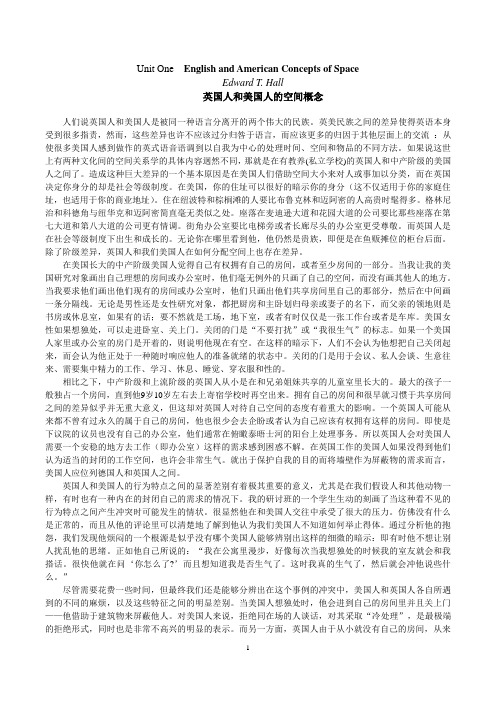
Unit One English and American Concepts of SpaceEdward T. Hall英国人和美国人的空间概念人们说英国人和美国人是被同一种语言分离开的两个伟大的民族。
英美民族之间的差异使得英语本身受到很多指责,然而,这些差异也许不应该过分归咎于语言,而应该更多的归因于其他层面上的交流:从使很多美国人感到做作的英式语音语调到以自我为中心的处理时间、空间和物品的不同方法。
如果说这世上有两种文化间的空间关系学的具体内容迥然不同,那就是在有教养(私立学校)的英国人和中产阶级的美国人之间了。
造成这种巨大差异的一个基本原因是在美国人们借助空间大小来对人或事加以分类,而在英国决定你身分的却是社会等级制度。
在美国,你的住址可以很好的暗示你的身分(这不仅适用于你的家庭住址,也适用于你的商业地址)。
住在纽波特和棕榈滩的人要比布鲁克林和迈阿密的人高贵时髦得多。
格林尼治和科德角与纽华克和迈阿密简直毫无类似之处。
座落在麦迪逊大道和花园大道的公司要比那些座落在第七大道和第八大道的公司更有情调。
街角办公室要比电梯旁或者长廊尽头的办公室更受尊敬。
而英国人是在社会等级制度下出生和成长的。
无论你在哪里看到他,他仍然是贵族,即便是在鱼贩摊位的柜台后面。
除了阶级差异,英国人和我们美国人在如何分配空间上也存在差异。
在美国长大的中产阶级美国人觉得自己有权拥有自己的房间,或者至少房间的一部分。
当我让我的美国研究对象画出自己理想的房间或办公室时,他们毫无例外的只画了自己的空间,而没有画其他人的地方。
当我要求他们画出他们现有的房间或办公室时,他们只画出他们共享房间里自己的那部分,然后在中间画一条分隔线。
无论是男性还是女性研究对象,都把厨房和主卧划归母亲或妻子的名下,而父亲的领地则是书房或休息室,如果有的话;要不然就是工场,地下室,或者有时仅仅是一张工作台或者是车库。
美国女性如果想独处,可以走进卧室、关上门。
高级英语上册课文翻译
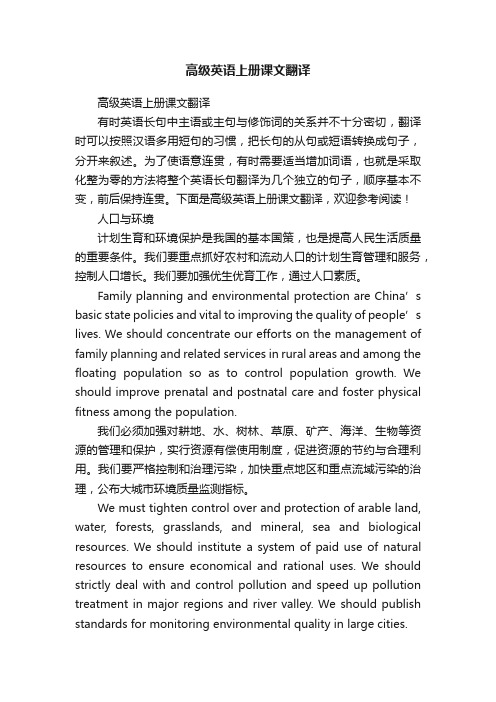
高级英语上册课文翻译高级英语上册课文翻译有时英语长句中主语或主句与修饰词的关系并不十分密切,翻译时可以按照汉语多用短句的习惯,把长句的从句或短语转换成句子,分开来叙述。
为了使语意连贯,有时需要适当增加词语,也就是采取化整为零的方法将整个英语长句翻译为几个独立的句子,顺序基本不变,前后保持连贯。
下面是高级英语上册课文翻译,欢迎参考阅读!人口与环境计划生育和环境保护是我国的基本国策,也是提高人民生活质量的重要条件。
我们要重点抓好农村和流动人口的计划生育管理和服务,控制人口增长。
我们要加强优生优育工作,通过人口素质。
Family planning and environmental protection are China’s basic state policies and vital to improving the quality of people’s lives. We should concentrate our efforts on the management of family planning and related services in rural areas and among the floating population so as to control population growth. We should improve prenatal and postnatal care and foster physical fitness among the population.我们必须加强对耕地、水、树林、草原、矿产、海洋、生物等资源的管理和保护,实行资源有偿使用制度,促进资源的节约与合理利用。
我们要严格控制和治理污染,加快重点地区和重点流域污染的治理,公布大城市环境质量监测指标。
We must tighten control over and protection of arable land, water, forests, grasslands, and mineral, sea and biological resources. We should institute a system of paid use of natural resources to ensure economical and rational uses. We should strictly deal with and control pollution and speed up pollution treatment in major regions and river valley. We should publish standards for monitoring environmental quality in large cities.我国人口众多,资源相对不足,经济规模越来越大,经济发展与资源和环境的矛盾日益突出,粗放型的经济增长方式难以为继。
高英第一课翻译
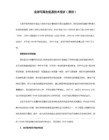
现在天真的黑了。我开始惭愧,是自己把他们拖得这么晚。我开始想上帝会怎么认为威斯特里。他当然也没有看见主,但现在正骄傲地坐在圣坛上,晃着灯笼裤的褪,露齿嘲笑我。周围围着一群跪着祈祷的老妇人。上帝并没有因为他亵渎神灵或在教堂里撒谎而惩罚他。所以我决定也许为了省去更多的麻烦,我最好也撒谎,说耶稣已经来了,然后站起来,得到救赎。
但那天晚上我却哭了。那是我一生倒数第二次哭泣,因为我已经是个12岁的大男孩了。我独自一人躺在床上,哭泣不已。担心里德阿姨会听到,我把头埋在被子下面。她还是醒了,告诉我的叔叔说:“我哭是因为神圣的上帝进入了我的生命,因为我看见了耶稣。但是我哭的真正原因是我羞于告诉她我撒谎了,我骗了教堂里所有人。我没有看见耶稣,我也不再相信有一个耶稣,因为他没有来拯救我。
布道师祷告,富有节奏,非常精彩。呻吟、喊叫、寂寞的呼喊,还有地狱中令人恐怖的画面。然后他唱了一首赞美诗。诗中描述了99只羊都安逸的待在圈里,唯有一只被冷落在外。唱完后他说道:“难道你不来吗?不来到耶稣身旁吗?小羊羔们,难道你们不来吗?”他向坐在祷告席上的小忏悔者们打开了双臂,小女孩们开始哭了,她们中有一些很快跳了起来,跑了过去。我们大多数仍然坐在那里。
在我快13岁那年,我的灵魂得到了拯救,然而并不是真正意义上的救赎。事情是这样的。那时我的阿姨里德所在的教堂正在举行一场盛大的宗教复兴晚会。数个星期以来每个夜晚,人们在那里讲道,唱诵,祈祷。连一些罪孽深重的人都获得了耶稣的救赎,教堂的成员一下子增多了。就在复兴晚会结束之前,他们为孩子们举行了一次特殊的集会——把小羊羔带回羊圈。里德阿姨数日之前就开始和我提这件事。那天晚上,我和其他还没有得到主宽恕的小忏悔者们被送去坐在教堂前排,那是为祷告的人安排的座椅。
- 1、下载文档前请自行甄别文档内容的完整性,平台不提供额外的编辑、内容补充、找答案等附加服务。
- 2、"仅部分预览"的文档,不可在线预览部分如存在完整性等问题,可反馈申请退款(可完整预览的文档不适用该条件!)。
- 3、如文档侵犯您的权益,请联系客服反馈,我们会尽快为您处理(人工客服工作时间:9:00-18:30)。
坤塔娜坤塔娜这一周要满11岁了。
她迈入青少年期的过程我只能用神气自信来形容,看着她从襁褓里一路成长,就像看棒球手桑迪·考法克斯投球或是比尔·拉赛尔打篮球那样精彩。
他们身上都有着一股不经意的傲气,觉得没有人能够做的比他们更好。
然而,对于一个父亲来说,看着女儿一天天成长却不是件容易的事。
每一次生日她都变得越来越像我们,一个大人,而我们却还沉浸于她孩提时的记忆。
我记得第一次看见她是在圣约翰医院的育儿室。
探望时间已经过了,我和妻子站在玻璃隔音墙外张望着,猜想摇篮里的孩子们哪一个是我们的。
随后,一个带着口罩的护士从后面的房间出来,手里抱着一个正在张牙舞爪的头上绑着蝴蝶结的黑发婴儿。
她才刚出生不到十七个小时,脸上的褶子还没打开、红扑扑的,手腕上的身份证明印的不是我们的名字,而是两个字母“NI”。
“NI”代表着“信息不详”,是医院给准备被领养的婴儿的代码。
昆塔娜是领养的。
对于我们来说,说出这几个字/公开这一点并不困难,尽管会引来尽管用意善良却让人不爽的赞美之辞。
“就算她是你们亲生的,你们也不可能更爱她了。
”每当这种时候,我和妻子都沉默不语,勉强从齿缝里挤出一点微笑。
然而,我们并不是没有意识到,在不远的将来,我们将会面临只有我们这些养父母才会面临的时刻——我们的女儿要决定是否去寻找她的亲生父母。
我记得在我成长的那个年代,不少广播剧是围绕领养展开的。
通常剧情都起因于一个孩子意外得知了自己是被领养的。
这些消息只能是意外得知,因为在那些日子里,父母告诉子女他们不是自己的亲生骨肉都被认为是有悖伦常的。
如果这个秘密不得不被泄露,通常都会加上一些似是而非的附加情节,如当孩子还在襁褓时,他的亲生父母就已双亡。
一场车祸也被认为是送走双亲最迅速有效的方式。
我的一个同龄人,当时是一名年轻的女演员,直到二十二岁成为她生父小笔遗产继承人时才得知自己是被收养的。
她的养母无法亲口告诉她遗产的来历,便把这个任务托付给了威廉姆·毛利事务所来完成。
如今,我们对此比以前开明了,心理学也证明了这样一味地隐瞒真相只会带来伤害。
当坤塔娜出生时,她是被接生她的妇产科医生私下交给我们的。
在加州,这样的私下收养不仅合法,在六十年代中期甚至非常普遍。
因为当时堕胎尚未合法化,性解放也未开始,人们还无法接受一个未婚母亲抚养自己的孩子。
那天晚上,我们第一次去圣约翰医院看坤塔娜时,我们之间有一个默契:“信息不详”只是一个手链。
对于同意如此开诚布公地对待坤塔娜的身世我们感到很自豪,但那纯粹是因为当时我们得知的唯一信息只是她妈妈的年龄,籍贯和健康证明。
我们没有想到的是,办事过程中的一个疏忽我们会知道她妈妈的名字,因为同样的疏忽,她也会知道我们的和坤塔娜的。
从我们把坤塔娜从医院抱回家的那天起,我们就努力不对她含糊其辞。
她还很小的时候,我们经常雇讲西班牙语的保姆。
她最初学的一些词中,有一个就是“领养”,尽管她还不懂这个词的意思。
随着她慢慢长大,她开始不知疲惫地问我们为什么我们收养的是她。
我们告诉她我们去医院时,医院允许我们选育儿室里的任何一个小孩。
“不,不是这个,”我们说:“不是这个,也不是这个。
”这些话都伴随着手势,直到:“就是这个!”她脸上会突然一亮,说:“坤塔娜。
”每当她问一个关于领养她的问题,我们就回答一个,除非她问起,我们不会主动提起。
我们明白随着她长大,她的问题会变得越来越尖锐,越来越复杂。
我用我认为她能明白的语言,努力去解释领养使父母有机会逃离基因的束缚。
因为无论亲生的孩子如何优秀,当孩子叛逆时,父母不得不承认他们的某些不良血液正在他们的子女体内流动着。
而领养的小孩,我们对他们的血统里任何不良因素都毫无责任。
后来,坤塔娜开始凭直觉意识到我们关于在育儿室任意选择的简单形容事实上要比我们说的复杂的多。
她现在知道,被收养意味着自己有另一个妈妈,并开始把那个人叫做“我的另一个妈妈。
”她问,我的另一个妈妈,当我出生的时候她多少岁啊?十八,我们回答。
然后,在她胖胖的小手指上她开始加上她自己的年龄,每一次生日,她的另一个妈妈就变成二十三,然后,二十五,二十八。
对此她没有什么特别的兴趣,只是偶尔问问。
有些问题容易回答,有些难点。
为什么她另一个妈妈不要她了?我们回答我们也不知道——这是真话——所以只能假定因为她自己也还只是个孩子,孑然一身无法抚养另一个孩子。
这个答案看起来很令她满意,至少直到我们和一个年轻的带着小孩的未婚妈妈成为密友之前。
此时,这种解释的矛盾之处不言而喻。
可是她似乎明白,用孩子的方式明白,从她出生以来社会就像是发生了千年巨变一样,在1966年一个未婚妈妈的压力远比1973年来的大的多。
(毕竟,她一直把白宫里的那个人叫做尼克松·越南·水门总统,就像他跟约翰·昆西·亚当一样名字里有三层。
)我们相信她能冷静地看待自己的身份,可究竟如何冷静我们却一直不知,直到她八岁生日。
生日派对来了二十个小女孩,正如小女孩经常做的一样,她们正在讨论一些“女性”的东西,尤其是她们从妈妈身上钻出来的那个洞。
“我可不是那样出来的,”坤塔娜声明。
她当时正坐在一张大藤椅上,她的话使其他孩子都陷入了沉默。
“我是被领养的。
”我们之前一直在想,当她与同龄人在一起时,她会怎样处理这一时刻。
我们于是就僵在那里,但她却泰然自若地将这个问题处理的如此妥当,以至于其他孩子很快就开始惋惜自己没有被领养,有一个孩子甚至宣称,“我差一点点就被领养了。
”因为我和妻子都在家里工作,坤塔娜一直都很清楚我们是如何维持生计的。
我们出神地盯着各自的打字机就意味着餐桌上的食物,这远比一句神秘的“去办公室上班”清楚的多。
从她学会走路以后,如果找不到带她的人,我们就带着她去开会,她对我们生活中的细微差异学的很快。
“她适应力非常强,”我的弟弟曾这么形容她。
“我每次见到她都是在不同的城市。
”我想她大概能够从一排警察中找出特工,有一天晚上吃饭的时候,她还出人意料地声称所有年轻的电影导演都是矮个子、卷发、穿迪图的裤子、戴眼镜、衬衫领口有三颗扣子敞着。
(据我所知,她从没见过波嘉诺维奇,斯皮尔伯格或斯科塞斯这些名导演。
)不久前,在电视转播的一个颁奖典礼上,一个因为我们写的剧本而获奖的女演员发表的获奖感言让坤塔娜非常气愤,说,“她都没有感谢我们!”看来她不仅认同我们的作品,有时甚至把自己看成是一个平等的参与者。
在写这篇文章之前,当然,我也和她讨论过,我告诉她这篇文章的内容,并且告诉她如果她觉得尴尬或者认为这个主题过于私人的话我会停笔的。
她想了一会儿,最后告诉我她希望我写下去。
然而,我必须试着解释,甚至可能是为我的动机辩护。
在《寻根》被拍成电视后一周,坤塔娜五年级班上的每一个孩子都被要求去追溯他们的家谱。
在我这一方坤塔娜追溯到她的曾祖父,本斯,一个内战后不久因为土豆荒从爱尔兰逃亡来的十岁难民。
在她母亲那一方,她追溯到了她曾曾曾曾外祖母康沃尔。
她是在1846年随马车队来到西部的。
碰巧,我对于除尚在世的直系亲属以外的其他亲戚没有什么兴趣。
(我从不记得我祖父的名字,亦不知我祖母娘家的姓氏。
对家族史毫无兴趣这点也使妻子困惑不解。
)然而,我想让坤塔娜明白如果她希望的话,除了多米尼克·本斯和南希·哈顿·康沃尔,她可以有其他的血缘选择。
在过去的几年里,围绕被领养的孩子寻根这一主题的文学作品越来越多。
对于他们这种追寻我深表同情,然而对于激进的寻根者的绝对主义则不然。
但是如果我不说我本人对于文学作品呈现养父母的方式深感不满的话,那便是我的失职。
我们在广播剧里的形象通常都是冷漠僵化,对于过去几代以来观念的改变无动于衷。
事实上,我们接受我们的孩子去寻找他们的根源,甚至鼓励他们,我们把它看成一场冒险,就像生活本身一样——也许会痛苦,但也希望能使它更加精彩。
我认识的养父母没有一个不这样想。
然而,文学作品总会含沙射影的认为我们把孩子寻找亲生父母的可能性看作一种威胁,一种不忠。
而这种假设中居高临下的态度却从未在作品中提及。
就好像我们是哈德孙和布里奇斯夫人,躲在楼下照顾孩子的替代品,可恶!我真是一点也不喜欢这!最近这些时候,我发现自己常会想到坤塔娜的亲生母亲。
我和妻子都承认我们对于能生出这个非比寻常的孩子的母亲的兴趣不只是心血来潮。
(据我们所知,她从没提到过孩子的父亲,更有趣的是,坤塔娜也从没问过他。
)当坤塔娜还小的时候,在领养手续办好之前,我们常常想象她的亲生母亲就在我们身边,像幽灵一样出现,目光直穿过铁丝网围墙注视着摇篮里正在晒太阳的孩子。
偶尔我们在杂志上看到一张年轻女士的照片——我们想象中她母亲的样子——我们会默默地把它递给对方。
我们曾经甚至通过模特经纪公司查过时尚一个模特的名字,结果她是一个芬兰人。
我经常在想她是否想过坤塔娜或者我们。
(不要忘了,我们是知道彼此的名字的。
)也有可能,因为承受不了生下孩子和放弃孩子的双重创伤,她可能会忘掉工作人员给她的这些名字,但是我不太相信这种假设。
我想更有可能的是她一直通过可查的资料默默地看着坤塔娜从孩子长成少女。
作家也算是半个公众人物,因为商业利益、宣传书和电影,或者就是出于虚荣,我们会接受采访、拍照、录制电视节目;我们甚至会写我们自己以及我们的孩子。
我一直好奇我们想象中这个年轻女人对于人物上的四页纸会有什么反应。
可能,十有八九,她会读到的。
我知道这样做不可原谅地侵扰到了她的私人空间。
然而,我又想,可能当夜幕降临时,她也曾想过或许将来某一天她打开门的时候会看见一个年轻女孩对她说:“你好,妈妈,我是你的女儿。
”也许这只是一个美好的幻想。
我们对于那个女人的生活情况一无所知,甚至不知道她是否还活着。
我们曾建议过我们的律师做一个审慎的调查,但他坚定地告诉我们是否调查这个权利只属于坤塔娜,而非我们。
回到现实中,其实在过去的几年里,坤塔娜已经知道了她亲生母亲的名字。
那是有一天吃晚饭的时候,她说她希望有一天能见到她,可是如果不知道她的名字的话那会很难。
终于,到了这个时刻:我们从没对她含糊其辞,难道我们现在要开始了吗?我们深吸了一口气,告诉了坤塔娜她母亲的名字,当时她十岁。
我们还告诉她如果她决定去找她,我们会尽我们所能来帮助她。
(但我必须承认我们希望她能等过了青少年的叛逆期之后再做决定。
)我们后来考虑到也许她的亲生母亲,因为好的或者环境的原因,可能希望不要见到她。
对于那些激进的、认为亲生母亲在这件事上没有任何选择权的人,我感到很困扰。
在我读过的一则新闻故事里,一个被领养的孩子是这样说:“我又没让她生我,所以她一定要见我。
”如果生活可以如此简单,如果痛苦可以不痛,那就好了。
然而,我们从没想过在这一点上影响坤塔娜。
找到自己的亲生父母有多重要这个问题只有她自己才能解答,也只有她自己才能决定。
所有的父母都意识到,或者都应该意识到,孩子并不是私有财产,而只是借给我们的,就像寄宿在家里的天使。
